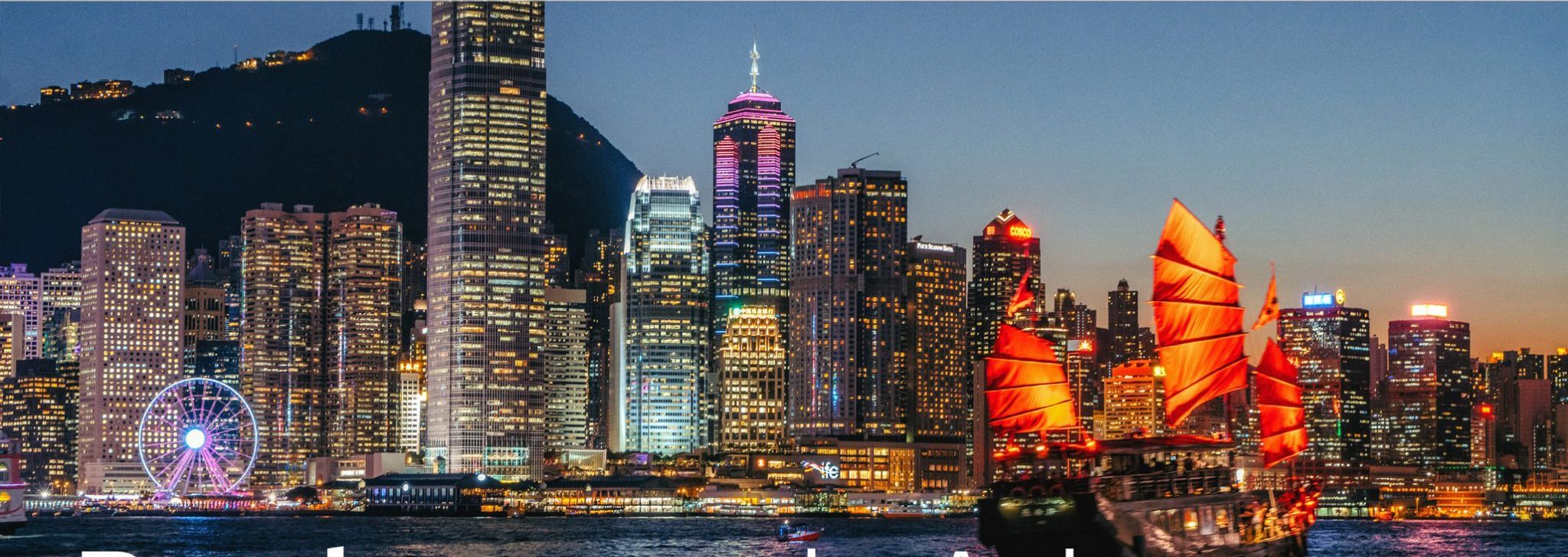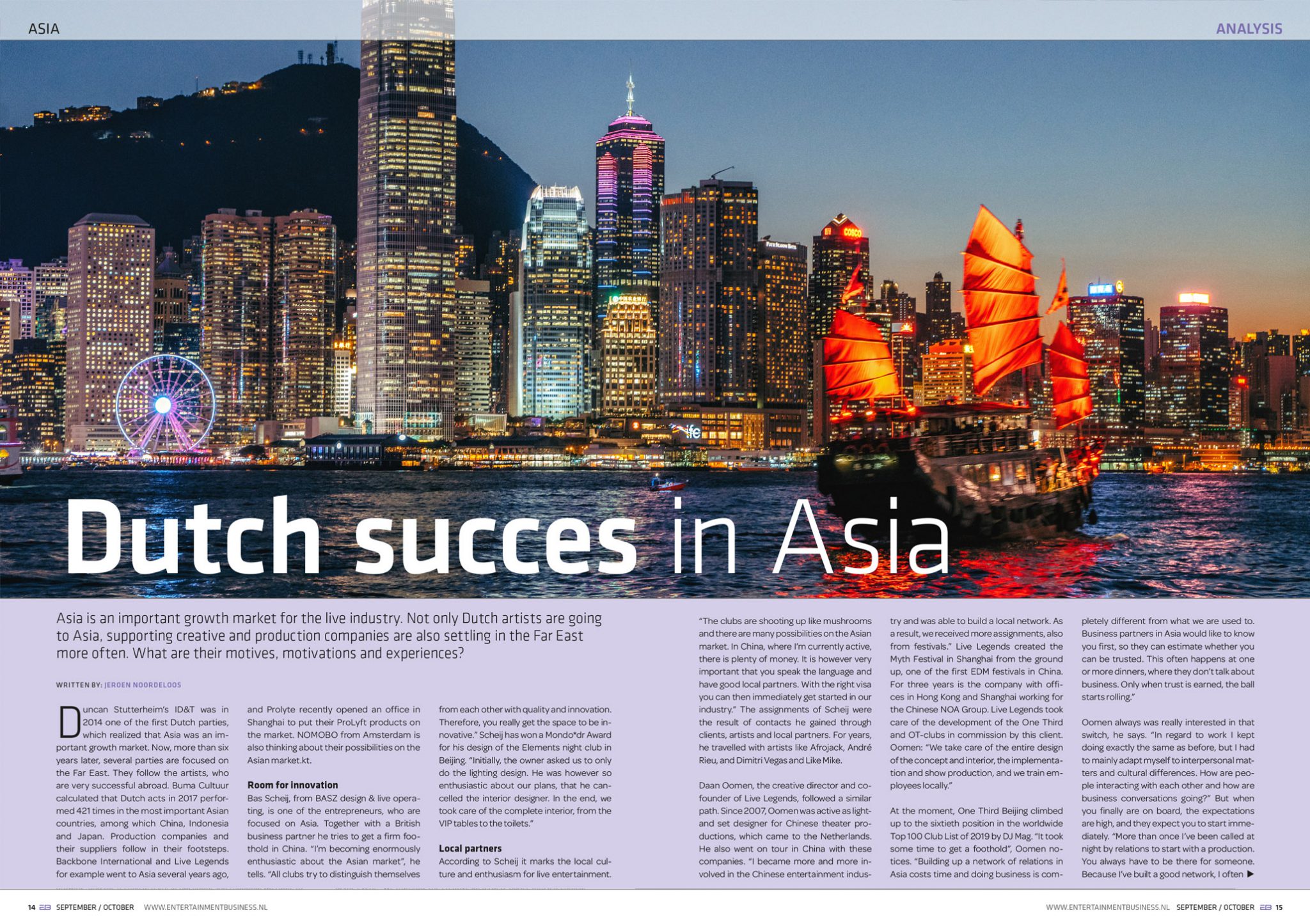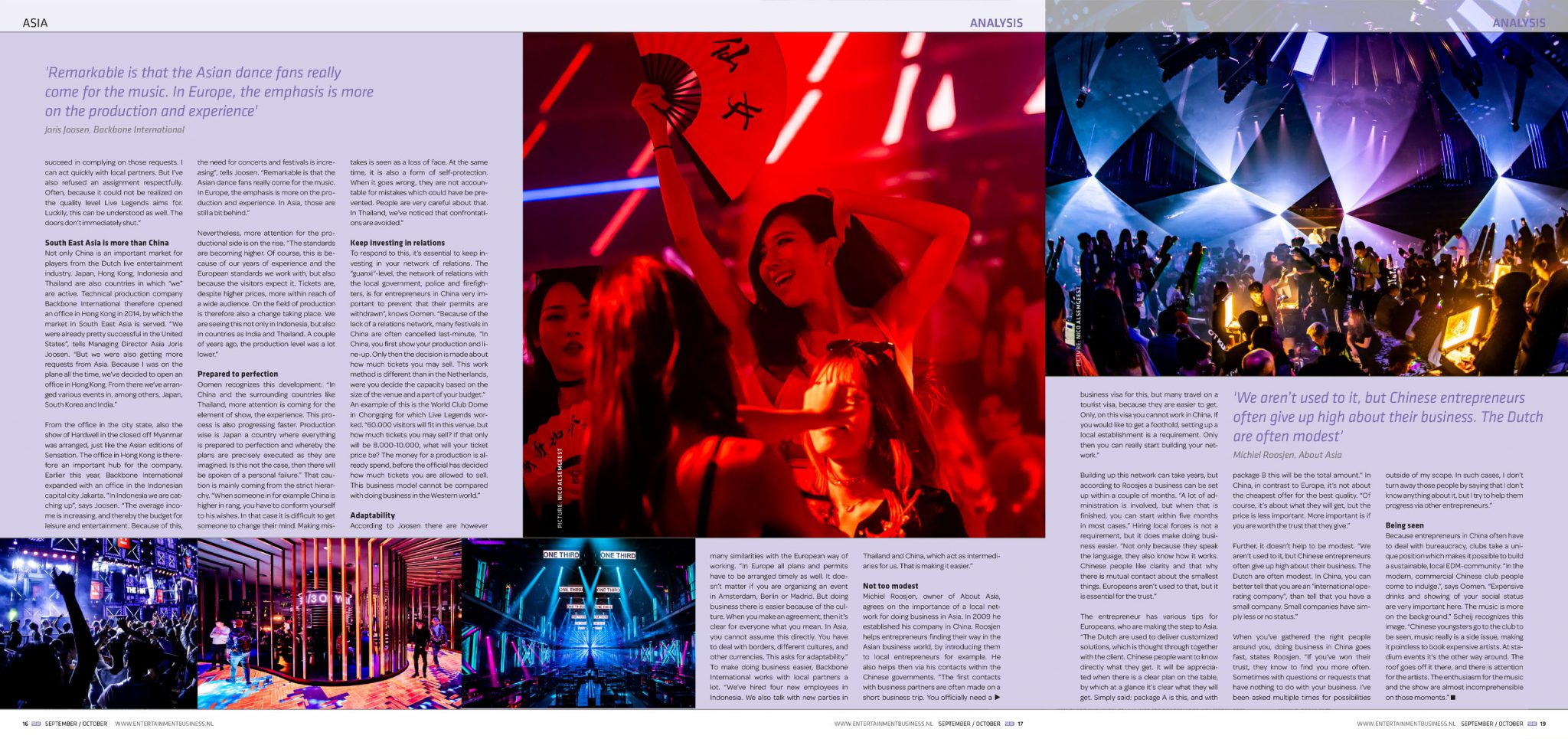

Asia is an important growth market for the live industry. Not only Dutch artists are going to Asia, supporting creative and production companies are also settling in the Far East more often. What are their motives, motivations and experiences?
Duncan Stutterheim’s ID&T was 2014 one of the first Dutch parties that realized that Asia was an important growth market. More than five years later, several parties are focusing on the Far East. They follow the artists who are very successful abroad. Buma Cultuur calculated that Dutch acts in 2017 performed 421 times in the most important Asian countries, among which China, Indonesia, and Japan. Production companies and their suppliers follow in their footsteps. Backbone International and Live Legends, for example, went to Asia several years ago, and Prolyte recently opened an office in Shanghai to put their ProLyft products on the market. NOMOBO from Amsterdam is also thinking about its possibilities in the Asian market.
Bas Scheij, from BASZ design & live operating, is one of the entrepreneurs focused on Asia. He is trying to get a firm foothold in China with a British business partner. “I’m becoming enormously enthusiastic about the Asian market,” he says. “All clubs try to distinguish themselves from each other with quality and innovation. Therefore, you get the space to be innovative.” Scheij has won a Mondo*dr Award for his design of the Elements nightclub in Beijing. “Initially, the owner asked us only to do the lighting design. He was, however, so enthusiastic about our plans that he canceled the interior designer. Ultimately, we took care of the complete interior, from the VIP tables to the toilets.”
According to Scheij, it marks the local culture and enthusiasm for live entertainment. “The clubs are shooting up like mushrooms, and there are many possibilities for the Asian market. There is plenty of money in China, where I’m currently active. It is, however, essential that you speak the language and have good local partners. You can immediately start in our industry with the right visa.” Scheij's assignments resulted from contacts he gained through clients, artists, and local partners. He traveled with artists like Afrojack, André Rieu, Dimitri Vegas & Like Mike for years.
Daan Oomen, Live Legends's creative director and co-founder, followed a similar path. Since 2007, Oomen has been active as a light- and set designer for Chinese theater productions that came to the Netherlands. He also went on a tour of China with these companies. “I became more and more involved in the Chinese entertainment industry and was able to build a local network. As a result, we received more assignments, also from festivals.” Live Legends created the Myth Festival in Shanghai from the ground up, one of the first EDM festivals in China. The company, which has offices in Hong Kong and Shanghai, has worked for the Chinese NOA Group for three years.
Live Legends took care of the development of the One Third and OT clubs in commission by this client. Oomen: “We take care of the entire design of the concept and interior, the implementation and show production, and we train employees locally.”
Currently, One-Third Beijing has climbed up to the sixtieth position in the worldwide Top 100 Club List of 2019 by DJ Mag. “It took some time to get a foothold,” Oomen notices. “Building up a network of relations in Asia costs time, and doing business is completely different from what we are used to. Business partners in Asia want to know you first to estimate whether you can be trusted. This often happens at one or more dinners, where they don’t discuss business. Only when trust is earned, the ball starts rolling.”
Oomen always was interested in that switch, he says. “Regarding work, I kept doing the same as before, but I had to adapt mainly to interpersonal matters and cultural differences. How are people interacting with each other, and how are business conversations going?” But when you finally are on board, the expectations are high, and they expect you to start immediately. “More than once, relations called me at night to start with a production. You always have to be there for someone. Because I’ve built a good network, I often succeed in complying with those requests. I can act quickly with local partners. But I’ve also respectfully refused an assignment. Often, this is because it could not be realized at the quality level Live Legends aims for. Luckily, this can be understood as well. The doors don’t immediately shut.”
“Building up a network of relations in Asia costs time and doing business is completely different from what we are used to."
China is one of many markets for players from the Dutch live entertainment industry. Japan, Hong Kong, Indonesia, and Thailand are also countries where “we” are active. Therefore, technical production company Backbone International opened an office in Hong Kong in 2014, serving the Southeast Asian market. “We were already pretty successful in the United States,” tells Managing Director Asia Joris Joosen. “But we were also getting more requests from Asia. Because I was always on the plane, we decided to open an office in Hong Kong. From there, we’ve arranged various events in, among others, Japan, South Korea, and India.”
The Hardwell show in closed-off Myanmar was also arranged from the office in the city-state, just like the Asian editions of Sensation. The office in Hong Kong is, therefore, an essential hub for the company. Backbone International expanded its office in Jakarta, Indonesia's capital city, earlier this year. “In Indonesia, we are catching up,” says Joosen. “The average income is increasing, thereby, the budget for leisure and entertainment. Because of this, the need for concerts and festivals is increasing”, tells Joosen. “It is remarkable that Asian dance fans come for the music. In Europe, the emphasis is more on the production and experience. In Asia, those are still a bit behind.”
Nevertheless, more attention is paid to the production side. “The standards are becoming higher. Of course, this is because of our years of experience and the European standards we work with, but also because the visitors expect it. Despite higher prices, tickets are more within reach of a wide audience. In the production field, there is, therefore, also a change taking place. We see this not only in Indonesia but also in countries such as India and Thailand. A couple of years ago, the production level was much lower.”
Oomen recognizes this development: “In China and the surrounding countries like Thailand, more attention is coming for the element of the show, the experience. This process is also progressing faster. Production-wise, Japan is a country where everything is prepared to perfection, and plans are precisely executed as they are imagined. If this is not the case, it will be considered a personal failure.” That caution is mainly coming from the strict hierarchy. “When someone in, for example, China is higher in range, you must conform to his wishes. In that case, getting someone to change their mind is difficult. Making mistakes is seen as a loss of face. At the same time, it is also a form of self-protection. They are not accountable for mistakes that could have been prevented when it goes wrong. People are cautious about that. In Thailand, we’ve noticed that confrontations are avoided.”
To respond to this, it’s essential to keep investing in your network of relations. The “guanxi” level, the network of relations with the local government, police, and firefighters, is very important for entrepreneurs in China to prevent their permits from being withdrawn,” knows Oomen. “Because of the lack of a relations network, many festivals in China are often canceled at the last minute. “In China, you first show your production and lineup. Only then will the decision be made about how many tickets you may sell. This work method is different than in the Netherlands, where you decide the capacity based on the size of the venue and a part of your budget.”
An example is the World Club Dome in Chongqing, where Live Legends worked. “60.000 visitors will fit in this venue, but how many tickets you may sell? If that only will be 8.000-10.000, what will your ticket price be? The money for production is already spent before the official decides how many tickets you can sell. This business model cannot be compared with doing business in the Western world.”
According to Joosen, there are, however, many similarities with the European way of working. “In Europe, all plans and permits have to be arranged timely as well. It doesn’t matter if you are organizing an event in Amsterdam, Berlin, or Madrid. But doing business there is easier because of the culture. When you make an agreement, then it’s clear to everyone what you mean. In Asia, you cannot assume this directly. You have to deal with borders, different cultures, and other currencies. This asks for adaptability.” To make doing business easier, Backbone International works with local partners a lot. “We’ve hired four new employees in Indonesia. We also talk with new parties in Thailand and China, which act as intermediaries for us. That is making it easier.”
Michiel Roosjen, owner of About Asia, agrees on the importance of a local business network. In 2009, he established a company in China. Roosjen helps entrepreneurs find their way in the Asian business world by introducing them to local entrepreneurs, for example. He also helps them via his contacts within the Chinese government. “The first contacts with business partners are often made on a short business trip. You officially need a business visa for this, but many travel on a tourist visa because they are easier to get. Only on this visa can you not work in China. If you want to get a foothold, setting up a local establishment is on of the requirements. Only then can you start building your network.”
Building up this network can take years, but according to Roosjen a business can be set up within a couple of months. “A lot of administration is involved, but when that is finished, you can start within five months in most cases.” Hiring local forces is not a requirement, but it does make doing business easier. “Not only because they speak the language, they also know how it works. Chinese people like clarity, and that is why there is mutual contact about the smallest things. Europeans aren’t used to that, but it is essential for the trust.”
Entrepreneurs have various tips for Europeans who are making the step to Asia. “The Dutch are used to delivering customized solutions, which are thought through together with the client. Chinese people want to know directly what they get. It will be appreciated when there is a clear plan on the table, by which, at a glance, it’s clear what they will get. Simply put, package A is this; with package B, this will be the total amount.” In China, in contrast to Europe, it’s not about the cheapest offer for the best quality. “Of course, it’s about what they will get, but the price is less important. More important is if you are worth the trust that they give.”
Further, it doesn’t help to be modest. “We aren’t used to it, but Chinese entrepreneurs often give up on their business. The Dutch are often modest. In China, you can better tell that you are an “international operating company”, than tell that you have a small company. Small companies have simply less or no status.” When you’ve gathered the right people around you, doing business in China goes fast, states Roosjen. “If you’ve won their trust, they know to find you more often. Sometimes, with questions or requests that have nothing to do with your business. I’ve had this question multiple times for possibilities outside of my scope. In such cases, I don’t turn away those people by saying that I don’t know anything about it, but I try to help them progress via other entrepreneurs.”
Because entrepreneurs in China often have to deal with bureaucracy, clubs take a unique position that makes it possible to build a sustainable, local EDM community. “In the modern, commercial Chinese club, people come to indulge.”, says Oomen. “Expensive drinks and showing off your social status are essential here. The music is more in the background.” Scheij recognizes this image. “Chinese youngsters go to the club to be seen; music is a side issue, making it pointless to book expensive artists. At stadium events, it’s the other way around. The roof goes off there, and there is attention for the artists. The enthusiasm for the music and the show are almost incomprehensible in those moments.”

